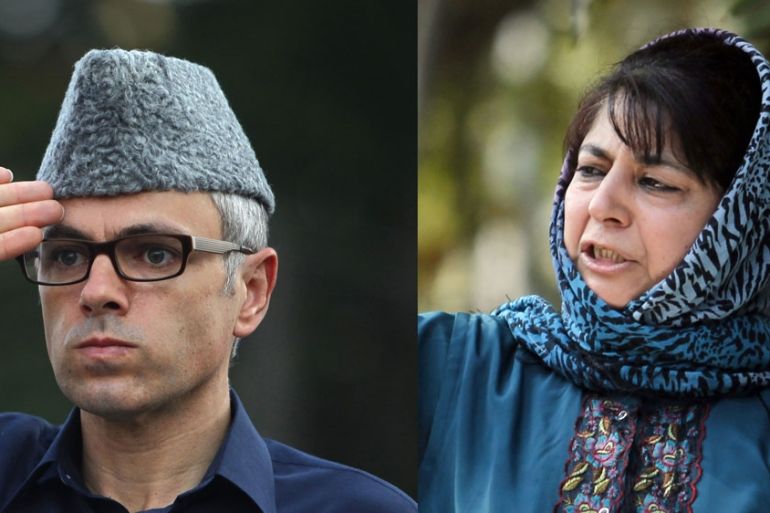‘Humiliated’: Top Kashmir leaders charged under ‘draconian’ law
Omar Abdullah and Mehbooba Mufti, the former chief ministers under detention since August, charged under PSA law.

Srinagar, Indian-administered Kashmir – Two former chief ministers of Indian-administered Kashmir have been charged under strict Public Safety Act (PSA) six months after they were detained.
Authorities on Thursday charged Omar Abdullah and Mehbooba Mufti under PSA – a law that allows detention without trial for up to two years – as part of a crackdown to prevent protests against New Delhi’s decision to strip the Muslim-majority region’s autonomy.
Keep reading
list of 3 items‘Viva La VPN’: Kashmiris use VPN apps to skirt social media ban
The day the story of Kashmir changed forever
A senior police official in the region told Al Jazeera that the PSA was slapped on the two formers chief ministers as the detention under the current charges could not be stretched beyond six months.
https://twitter.com/news_bracket/status/1225457599572668416?ref_src=twsrc%5Etfw
“Since government was running out of options PSA was slapped on them,” the official, who did not want to be named, said.
Besides the two former chief ministers, a few more mainstream politicians have been booked under the same law that has been described as “draconian” by the Amnesty International.
India’s Hindu nationalist government imposed a security lockdown in Kashmir hours before it abrogated Article 370 of the constitution which granted the Himalayan region special status and protected its demography.
Massive crackdown
Thousands of people have been arrested, including pro-India and separatist politicians, as part of the massive crackdown that has been criticised by the UN human rights body.
Earlier, the Indian government, led by right-wing Bharatiya Janata Party (BJP), also booked Farooq Abdullah, a three-time chief minister and a sitting parliamentarian under the same law. Farooq has completed half a year in detention.
Members of the Abdullah family have ruled the Muslim-majority region for most of the last 70 years.
|
|
The strict measures against the mainstream politicians were taken after they strongly opposed the government’s move to abrogate the special law that had provided the region with a separate constitution, a flag and barred outsiders from the permanent settlements.
While the Indian government claims that things are normal in Kashmir, the tension continues to persist as internet services continue to be partially cut off in the region with strict curbs on dissent.
Iltija Mufti, the daughter of former Chief Minister Mehbooba Mufti, whose Peoples Democratic Party (PDP) ran the regional government in alliance with the BJP, told Al Jazeera that the government “is hurtling to become a banana republic”.
“For them statements that are laid with division and bigotry are acceptable. But if we stand for our people, as Jammu and Kashmir is the only Muslim-majority state in India, they give us a collective punishment that started with first disempowering people and then creating a sense of fear psychosis,” she said.
“Farooq Abdullah is a member of parliament and you cannot punish somebody who is an elected representative. It is his fundamental right to say how he feels and has a right to attend the parliament. But there is no respect for the rule of law.
“They cannot behave like autocrats.”
‘Kashmiris are being humiliated’
Imran Nabi Dar, a politician from National Conference (NC), termed the slapping of PSA on the two leaders as “shocking”.
“It was never expected that things will come to this point. It is the same people who participated in [mainstream politics] despite the killings of their party workers for aligning with electoral politics. I don’t know where we are heading, it’s a dark tunnel,” he said.
“There are no tourists here, economy is down the drain, and there is no political activity. Just having shops open and cars moving does not mean anything is normal. Kashmiris are being humiliated again and again.”
A political analyst based in Kashmir said these actions show the government’s “insecurities”.
“It means that the government is quite insecure to allow elected politicians by their own laws to come into the picture. The other thing is not allowing freedom of expression no matter what Mehbooba and Omar say,” said Siddiq Wahid, who is based in Srinagar, the main city in the disputed region.
India and Pakistan, who have fought two of their three wars over Kashmir, claim the disputed in full, but control only parts of it.